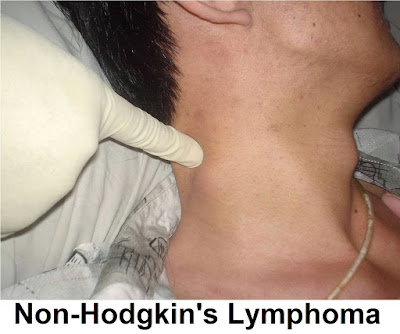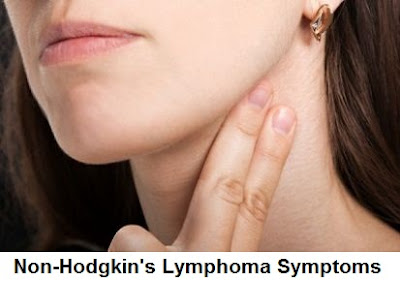What is non-Hodgkin's lymphoma?
Non-Hodgkin's lymphoma is a type of cancer. The cancer is in the lymphatic system.
The lymphatic system helps the body to stay healthy. Special cells fight viruses and bacteria. These cells are called lymphocytes.
People with non-Hodgkin's lymphoma have far too many lymphocytes in their body. The body can not stand it. By the abnormal growth of the lymphocytes can not do their job. The immune system decreases. That means you can easily get infections.
Non-Hodgkin's lymphoma usually occurs in the lymph nodes. The disease is sometimes the pharynx, respiratory tract, spleen, gut and bone marrow.
The main treatments in non-Hodgkin's lymphoma include:
- radiation;
- chemotherapy;
- immunotherapy.
What are the signs and symptoms of non-Hodgkin's lymphoma?
The first phenomenon of non-Hodgkin's lymphoma is usually that swell to one or more lymph nodes. You then feels a bump in place of a gland. For example, this may be under the jaw, at the bottom of the neck, in an armpit or in one of the groins. The swellings do not hurt. Sometimes they are sensitive when you press it.
Non-Hodgkin's lymphoma in a different location in the lymph tissue shows symptoms of the organ where the lymphoma is, for example, stomach or intestinal problems.
In addition, you may experience:
- fever;
- not feel like eating;
- unintentional weight loss;
- fatigue without apparent cause;
- heavy sweating, especially at night.
Classification of non-Hodgkin's lymphomas
There are two groups of non-Hodgkin-lymphomas:
- Indolent non-Hodgkin's lymphoma. These lymphomas are composed of cells that are not very malicious. The cells grow slowly. Symptoms appear gradually. Approximately 40% of people with non-Hodgkin has this form.
- Aggressive non-Hodgkin's lymphoma. These lymphomas consist of very malignant cells. The cells grow and spread rapidly. The complaints also arise quickly. About 60% of people with non-Hodgkin has this form.
For the proper treatment, it is important to know which form non-Hodgkin's lymphoma you have. Also, the doctor looks in which type of cells the lymphoma is composed: of B-cells or T-cells. B-cell non-Hodgkin's lymphoma is the most common type (85%).
Aggressive lymphomas are more evil than the indolent lymphomas. Yet many people with the aggressive form long life, whether they healed.
Indolent lymphomas are with chemotherapy and radiation therapy, often for years to keep under control. Unfortunately heal very few people with the indolent form of non-Hodgkin.
Non-Hodgkin's lymphoma diagnosis
To find out if you have non-Hodgkin's lymphoma, the doctor will first ask about your symptoms. Then a physical examination. Probably the GP also allows your blood.
Depending on the results of this blood test is sometimes further research is needed. You will receive a referral to a specialist. This is often a surgeon or an internist. The specialist will examine you again and leave again check your blood.
To determine whether you have non-Hodgkin's lymphoma is a puncture or require a biopsy.
When the doctor gets a puncture with a thin, hollow needle to tissue cells and / or fluids from a swollen lymph node. You probably will not get anesthesia at the puncture.
The study is carried out by a radiologist, a surgeon or pathologist. After the puncture, the pathologist evaluates the cells under the microscope. Usually it is then clear that the abnormality is benign or malignant.
To be sure to know if you have non-Hodgkin's almost always require a biopsy. Also, in order to determine the type of lymphoma, a biopsy is needed. The surgeon hereby pulls a piece of lymphoid tissue from the suspicious place. This is done under local anesthesia or under general anesthesia. A pathologist examines the lymphoid tissue under the microscope.
You are given a general anesthetic? Then you probably need to stay one or two days in the hospital.
More research in non-Hodgkin's lymphoma cancer
If you have non-Hodgkin's lymphoma, then more research is needed.
You can get the following examinations:
- ENT examination. An ear, nose and throat examine your throat and nasal cavity. The throat and nasal fact contains lymphoid tissue.
- CT-scan. In non-Hodgkin's lymphoma may be a CT scan of the chest and / or stomach are needed. The CT scans showed that the lymph nodes are swollen. It also becomes clear where the lymph nodes are swollen. The study also shows that the spleen and liver are affected.
- PET scan.
- Bone Marrow Examination.
- MRI scan .
- Ultrasound. Ultrasound shows the size of the lymph nodes. The doctor will get a better picture of abnormalities in the liver and spleen, which are found by the CT scan.
What is the treatment for non-Hodgkin's lymphoma?
The treatment of non-Hodgkin's lymphoma depends on:
- How extensive is the disease;
- How fast growing lymphoma;
- The type of cells from which the lymphoma is composed;
- Your age and condition.
- Radiation (radiotherapy);
- Chemotherapy;
- Immunotherapy.
- If you have an indolent non-Hodgkin's lymphoma? Then the doctor begins with the treatment if you have any complaints. You will have regular checkups. The indolent form generally do not heal. The doctor may reduce the disease with chemotherapy, immunotherapy and radiotherapy.
- If you have an aggressive non-Hodgkin's lymphoma? Then the doctor begins immediately after diagnosis with the treatment. The goal is healing. Often, a combination of chemotherapy and immunotherapy the best treatment. The lymphoma not responding well to the treatment, the doctor may recommend a very heavy chemotherapy with a stem cell transplant. Even when the disease comes back after successful treatment, the doctor may give this treatment.



